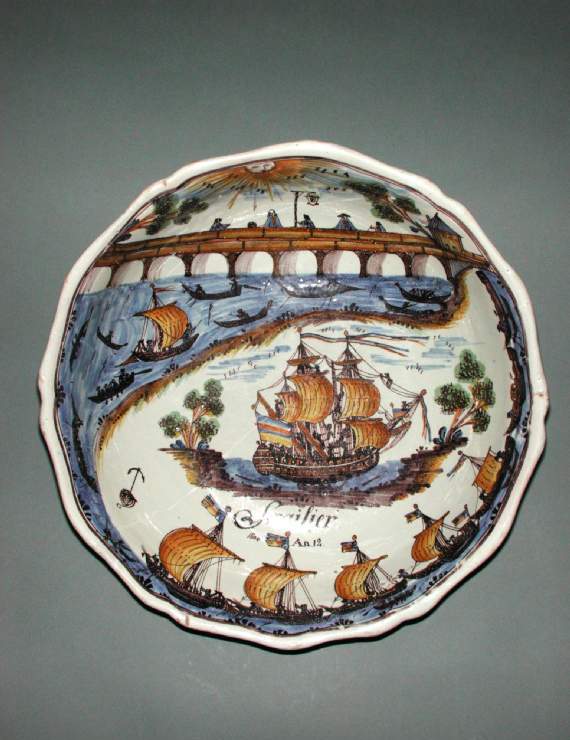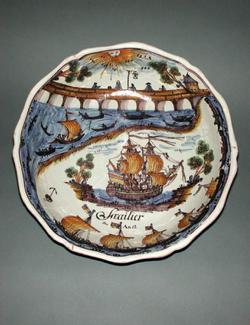Current Location: In storage
Maker(s)
Production:
Unknown
Entities
Categories
Description
Bowl of tin-glazed earthenware (faïence), painted in polychrome high temperature colours with the bridge at Nevers and shipping on the river Loire, and inscribed 'Francois/Frailier/1804 An 12'
Earthenware, moulded, tin-glazed, and painted in blue, olive-green, two shades of brownish-yellow, and manganese-purple. Circular with a wavy rim, and deep curved and obliquely fluted sides, standing on a foortring pierced by two holes for suspension. Decorated at the top with the sun shining over the Pont de Nevers which has a lantern in the middle and is flanked by trees. Five figures are crossing the bridge. Below there are small boats on the river Loire, one with a sail. The river curves round the circumference and has five larger sailing boats round the lower edge, with other boats laden with barrels in tow. In the middle there is double-masted frigate flying the French tricolour flag, flanked by trees. Below the ship is the inscription 'Francois/Frailier/1804 An 12' (year 12).
Notes
History note: V. Deschamps, 60 rue Beau Voisine, from whom purchased on 10 January 1907 for 50 francs by Dr J.W.L. Glaisher, FRS, Trinity College, Cambridge
Legal notes
Dr J.W.L. Glaisher Bequest
Measurements and weight
Height: 9 cm
Acquisition and important dates
Method of acquisition: Bequeathed
(1928-12-07)
by
Glaisher, J. W. L., Dr
Dating
19th Century, Early
Napoleon I
Production date:
AD 1804
: The bowl was made in the year in which Napoléon was crowned Emperor of the French, but the date 1804 is recorded as Year 12 according to the Revolutionary Calendar which had been introduced by decree on 5 October 1793, and backdated to 22 Spetember 1792. That year became Year 1 of the new era, and Sundays and the seven day week were abolished in favour of a ten day cycle. The new Calendar was unpopular and unworkable despite coercion to enforce adherence to it, and modifications were made to it in 1799 and 1800. Finally in September 1805 a decree restored Sunday as the day of rest, and the Gregorian Calendar was reinstated on 1 January 1806.
Components of the work
Decoration
composed of
high-temperature colours
( blue, olive-green, two shades of brownish-yellow, and manganese-purple)
Rim
Diameter 32.9 cm
Materials used in production
Tin-glaze
Earthenware
Techniques used in production
Moulding
: Earthenware, moulded, tin-glazed, and painted in blue, olive-green, two shades of brownish-yellow, and manganese-purple
Tin-glazing
Inscription or legends present
- Text: 'Francois/Frailier/1804 An 12
- Location: Inside the bowl below the large ship
- Method of creation: Painted in
- Type: Inscription
References and bibliographic entries
Identification numbers
Accession number: C.2335-1928
Primary reference Number: 73374
Old object number: 2618
Stable URI
Audit data
Created: Saturday 6 August 2011
Updated: Tuesday 9 September 2025
Last processed: Thursday 11 September 2025
Associated departments & institutions
Owner or interested party:
The Fitzwilliam Museum
Associated department:
Applied Arts





